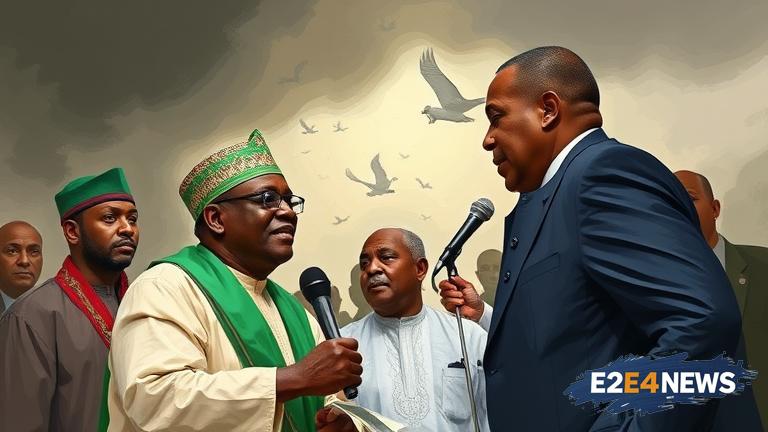The African Democratic Congress (ADC) coalition saga has taken a dramatic turn, with Senator Shehu Sani weighing in on the matter. Sani likened the situation to buying a disputed house from siblings in court, highlighting the complexities and challenges involved. The ADC coalition has been at the center of controversy in recent times, with various factions and interests vying for control. The situation has sparked intense debate and discussion, with many calling for clarity and resolution. The ADC is one of the major opposition parties in Nigeria, and its coalition saga has significant implications for the country’s political landscape. The party has been plagued by internal conflicts and power struggles, which have hindered its ability to effectively challenge the ruling party. The coalition saga has also raised questions about the role of external factors and interests in Nigerian politics. Some have accused external forces of meddling in the ADC’s internal affairs, while others have pointed to the party’s own internal weaknesses and divisions. The situation has been further complicated by the involvement of various stakeholders, including politicians, activists, and civil society organizations. Despite the challenges, many remain optimistic about the potential for the ADC to play a significant role in Nigerian politics. The party has a strong base of support and a clear vision for the country’s future. However, it must first resolve its internal conflicts and present a united front. The ADC coalition saga has also highlighted the need for greater transparency and accountability in Nigerian politics. Many have called for greater scrutiny of political parties and their activities, as well as more robust mechanisms for resolving disputes and addressing conflicts. The situation has also sparked debate about the role of the judiciary in Nigerian politics, with some calling for greater judicial intervention to resolve the ADC coalition saga. Others have argued that the judiciary should exercise caution and avoid interfering in political matters. The ADC coalition saga has significant implications for the 2023 general elections, which are expected to be highly contested. The party’s ability to resolve its internal conflicts and present a united front will be crucial in determining its chances of success. The situation has also highlighted the need for greater political education and awareness among Nigerians. Many have called for more robust civic education programs to help citizens better understand the political process and make informed decisions. The ADC coalition saga has also sparked debate about the role of social media in Nigerian politics, with some arguing that it has contributed to the spread of misinformation and confusion. Others have argued that social media has provided a vital platform for citizens to engage with politics and hold leaders accountable. The situation has also raised questions about the future of opposition politics in Nigeria, with some arguing that the ADC coalition saga has weakened the opposition and created opportunities for the ruling party. Others have argued that the saga has highlighted the need for greater opposition unity and cooperation. The ADC coalition saga has also sparked debate about the role of international organizations and diplomatic missions in Nigerian politics. Some have accused these organizations of interfering in Nigeria’s internal affairs, while others have argued that they have a vital role to play in promoting democracy and good governance. The situation has also highlighted the need for greater economic development and growth in Nigeria, with many arguing that the country’s economic challenges have contributed to the political instability. The ADC coalition saga has significant implications for Nigeria’s economic future, with some arguing that it has created uncertainty and undermined investor confidence. Others have argued that the saga has highlighted the need for greater economic diversification and reform. The situation has also sparked debate about the role of traditional leaders and institutions in Nigerian politics, with some arguing that they have a vital role to play in promoting peace and stability. Others have argued that they have been marginalized and excluded from the political process. The ADC coalition saga has also raised questions about the future of Nigerian democracy, with some arguing that it has highlighted the need for greater democratic consolidation and reform. Others have argued that the saga has undermined confidence in the democratic process and created opportunities for authoritarianism.





